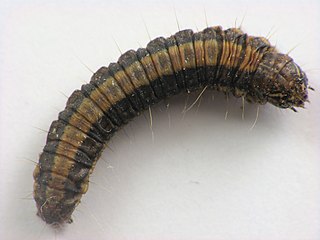
The Pyraloidea are a moth superfamily containing about 16,000 described species worldwide, and probably at least as many more remain to be described. They are generally fairly small moths.
Davana is a genus of moths of the family Crambidae. It contains only one described species, Davana phalantalis. The identity of this species is unknown, since the type is lost.

Evergestis is a genus of moths of the family Crambidae described by Jacob Hübner in 1825. A number of species are pests, including the cross-striped cabbageworm, a pest of cole crops such as cabbage.

The Epipaschiinae are a subfamily of snout moths. Almost 600 species are known today, which are found mainly in the tropics and subtropics. Some occur in temperate regions, but the subfamily is apparently completely absent from Europe, at least as native species. A few Epipaschiinae are crop pests that may occasionally become economically significant.

The Phycitini are a tribe of moths of the family Pyralidae.

The Anerastiini are a tribe of moths of the family Pyralidae.

Synclera traducalis, the variegated pearl, is a species of moth in the Crambidae family. It is found in Sweden, Bulgaria, Cyprus, the Canary Islands, Israel, the Palestinian Territories, Lebanon, Syria, Saudi Arabia, the United Arab Emirates, Yemen, Egypt, Mali, Senegal, Equatorial Guinea, South Africa, La Réunion, India and Sri Lanka.
Pandoflabella nigriplaga is a species of snout moth in the genus Pandoflabella. It was described by Paul Dognin in 1910, and is known from French Guiana.
Pandoflabella brendana is a species of snout moth in the genus Pandoflabella. It is found in French Guiana.
Pandoflabella corumbina is a species of snout moth in the genus Pandoflabella. It is found in Bolivia.
Pandoflabella guianica is a species of snout moth in the genus Pandoflabella. It is found in French Guiana.
Pandoflabella nigrilunalis is a species of snout moth in the genus Pandoflabella. It is found in Guyana.
Pandoflabella olivescens is a species of snout moth in the genus Pandoflabella. It is found in Costa Rica.
Pandoflabella remberta is a species of snout moth in the genus Pandoflabella. It is found in French Guiana.
Pandoflabella stenipteralis is a species of snout moth in the genus Pandoflabella. It is found in French Guiana.
Pandoflabella strigidiscalis is a species of snout moth in the genus Pandoflabella. It is found in Central America.
Pandoflabella tresaina is a species of snout moth in the genus Pandoflabella. It is found in French Guiana.

Scopariinae is a subfamily of the lepidopteran family Crambidae. The subfamily was described by Achille Guenée in 1854.
Eugene G. Munroe was a Canadian entomologist who discovered numerous species of insects. He worked for the Insect Systematics and Biological Control Unit, Entomology Division in Ottawa, Canada.







